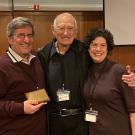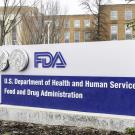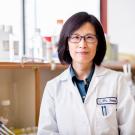Annual Grodsky Award Presented at WRISG
The Annual Grodsky award, supported by Diabetes Center at UCSF, was presented at the Western Region Islet Study Group (WRISG) meeting this year to Steve Kahn, MB, ChB, Director of University of Washington Diabetes Research Center, whose talk was “Clinical Observations and Science: Including Some Lessons Gerry Taught Me.” Present with Gerold Grodsky and Steve Kahn was Lori Sussel, Director of Basic and Translational Research at the Barbara Davis Center for Diabetes at University of Colorado.






